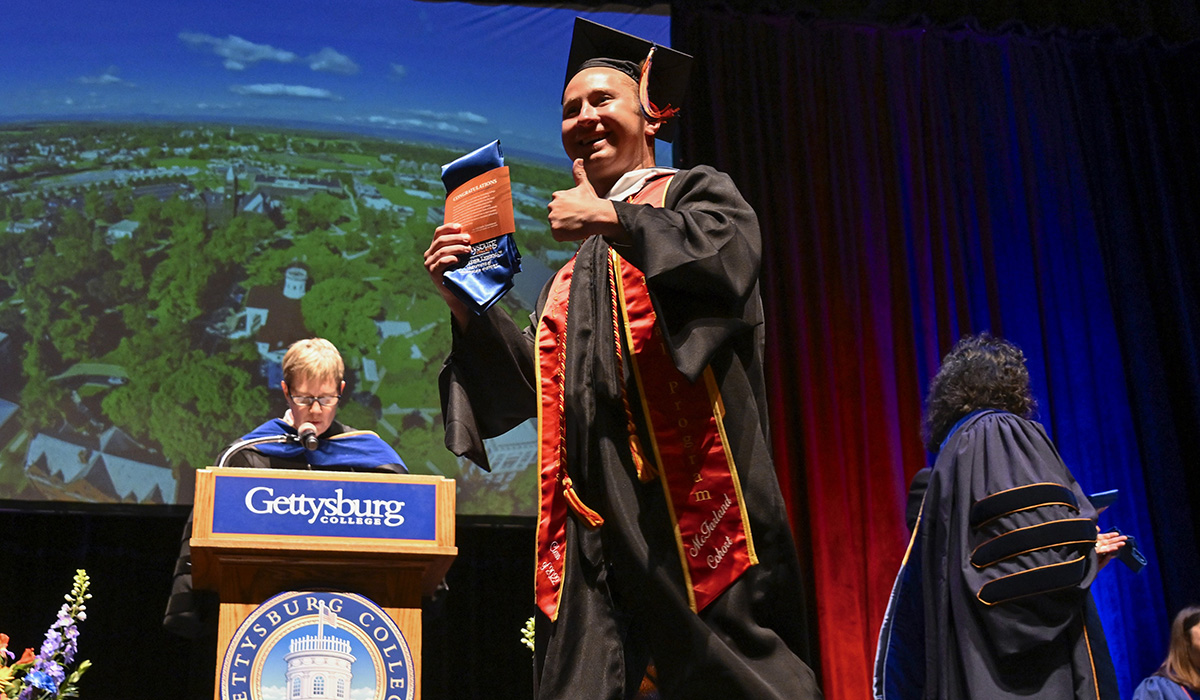
The Gettysburg College-Gilder Lehrman Institute Master of Arts in American History program fulfills Gettysburg’s mission of providing A Consequential Education to lifelong learners eager to expand their knowledge as they encourage a compassionate and informed society. Gettysburg College celebrated the achievements of its second class of master’s graduates at The Majestic Theater on Wednesday, July 10, recognizing 178 students from the Winter 2023 and Spring 2024 cohorts who had completed their degree requirements.
Gettysburg College, in partnership with The Gilder Lehrman Institute of American History, offers this master’s program in American history, which launched in September 2022. Participants in the fully online, fully accredited program include K-12 educators, community college instructors, district supervisors, museum professionals, and National Park Service employees affiliated with the GLI. The program provides these educators with a deeper understanding of American history, inspiring a generation of scholars to advance the “unfinished work” that President Abraham Lincoln declared in his Gettysburg Address.
“As educators, we are called to equip our students with the tools to think critically, to act compassionately, and to contribute meaningfully to the world around them,” Gettysburg College Provost Jamila Bookwala conveyed to the graduates, composed of teachers, scholars, and historians from across the country. “Your work is essential. It ensures that today’s students are prepared to face the formidable forces of tomorrow with courage and clarity.”
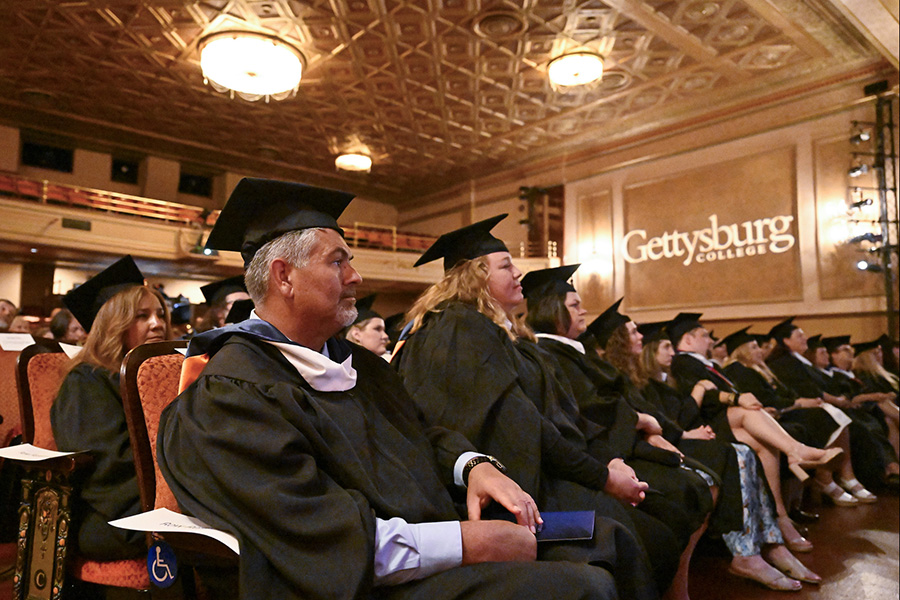
From the Majestic Theater’s main stage, Bookwala greeted the graduates and their families sitting in the audience, noting the hard work and effort it took for the graduates to get to this distinctive moment in their lives and the impact they can have on their students and communities going forward as Gettysburg graduates.
“Our world needs the effective leaders and socially responsible citizens we produce—those who understand today’s complex landscape and can apply the knowledge and skills they’ve acquired here to make a positive impact,” Bookwala said.
“As educators, we are called to equip our students with the tools to think critically, to act compassionately, and to contribute meaningfully to the world around them. Your work is essential. It ensures that today’s students are prepared to face the formidable forces of tomorrow with courage and clarity.”
– Gettysburg College Provost Jamila Bookwala
Bookwala recalled the heroic efforts of Union Gen. John Buford during the Battle of Gettysburg 161 years ago. Recognizing the value of the terrain around him, Buford put his outnumbered cavalry division out in front of the invading Confederate forces, halting their advance and allowing approaching Union troops to settle into the nearby high ground at Cemetery Hill and Cemetery Ridge. His decision-making—based on a wider perspective of the scene before him—set the stage for Northern victories on July 2 and July 3 that turned the tide of the battle and, ultimately, the Civil War.
Said Bookwala, “Just as Gen. Buford’s foresight secured a pivotal advantage for the Union Army, your vantage point as teachers and history scholars can likewise position your students to see beyond the here and now and connect how our past and present can forever shape our future.”
Practicing our humanity through history
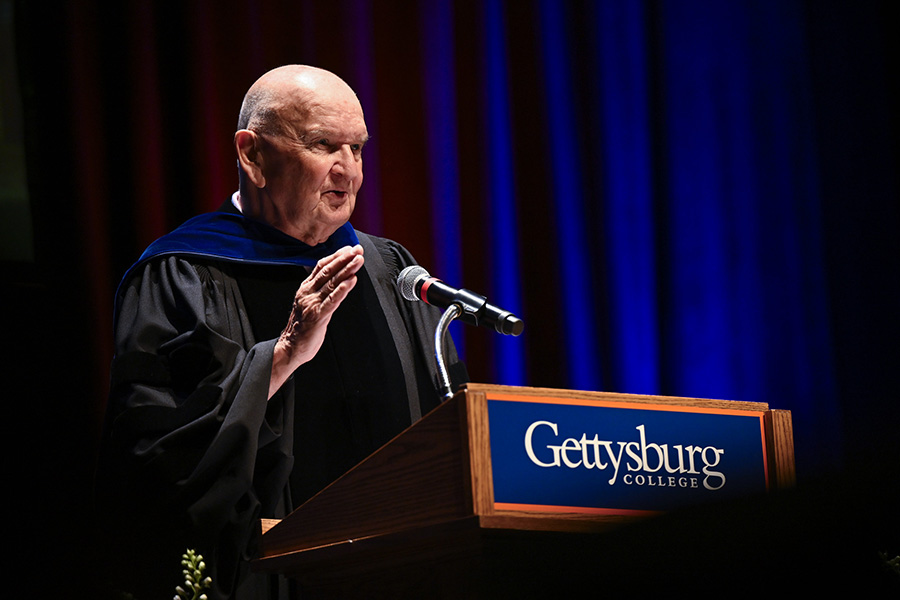
Lisa M.F. Andersen, director of academic strategy at The Gilder Lehrman Institute of American History, introduced esteemed historian, scholar, author, and Commencement speaker Elliott West. Dr. West is the Alumni Distinguished Professor of American History Emeritus at the University of Arkansas and one of the lead professors in the Gettysburg College-Gilder Lehrman Institute Master of Arts program.
A past president of the Western History Association, his most recent work, “Continental Reckoning: The American West in the Age of Expansion,” won the 2024 Bancroft Prize in American History and Diplomacy, one of the most distinguished and coveted awards in the field of American history. He was also a finalist for the 2024 Pulitzer Prize for History.
A two-time Teacher of the Year at the University of Arkansas, Dr. West noted the importance of history as a type of science, allowing us to study patterns from the past to inform the future. He commented that history does not repeat itself but seems to rhyme through the many years.
“That’s the way history works,” Dr. West said. “It never repeats itself. It’s always changing. If history never repeats itself, we can encourage our students to look to the past to look for patterns. There are historical patterns, not laws. There are historical patterns, things that people have done over time, that kind of resonate with what we see today.”
According to Dr. West, history is a practice and skill that only humans are capable of. It makes us distinctly unique as a species and opens our hearts to compassion and understanding.
“What we encourage our students to do, as students of history, is to use this unique trait of being able to project yourself into the lives of others in the past, using evidence to imagine your way into other worlds,” Dr. West said. “The only way that human beings over time can coexist with other human beings is to be able to imagine our way into the lives of others. The ability of historical imagination is basically compassion.”
Doing great work together
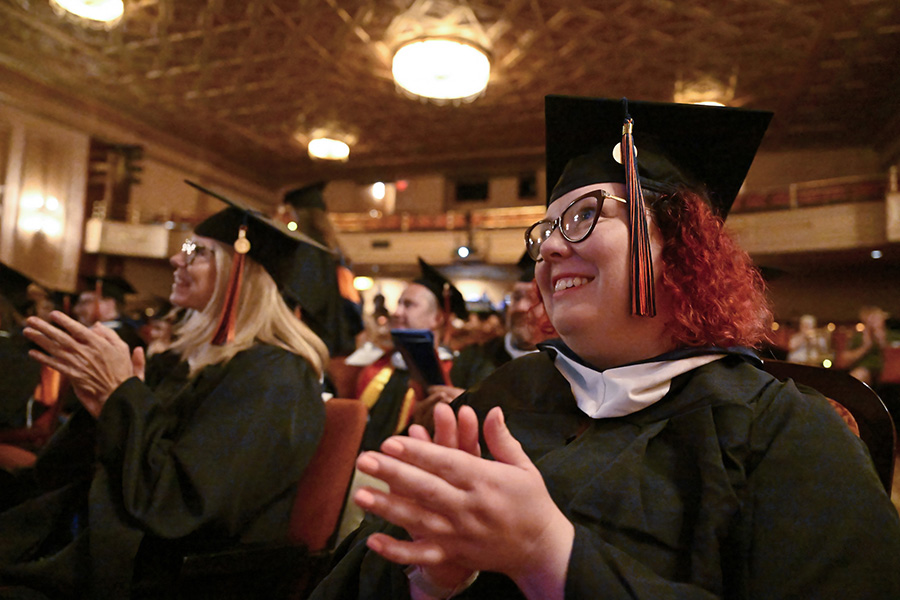
In front of their families and friends, the graduates filed across the Majestic Theater stage to receive a Stole of Gratitude from Bookwala, a cherished tradition during Gettysburg College’s Commencement ceremony. Every Gettysburg graduate receives a Stole of Gratitude as a gift from the Gettysburg College Alumni Association.
Bookwala noted the importance of the Stole of Gratitude in recognizing people who were instrumental in the graduate’s success. Following the ceremony, many graduates bestowed their new blue Stoles to family members who were in attendance.
“The Stole is meant to serve as a symbol of appreciation to the many people who have been instrumental in bringing you to this important milestone in your life,” Bookwala said. “No great accomplishment is achieved alone. It is only through the love and support of the people around us that we truly realize our fullest potential.”
The new Gettysburg graduates join a global network of 32,000 alumni. Nicki West, executive director of Alumni Engagement and Annual Giving, welcomed the new alumni to the start of a journey within the Gettysburg community—a community poised to support and empower its members to be leaders and changemakers in a complex society.
“One of my favorite aspects of my work is the opportunity it provides me to connect in meaningful ways with our alumni,” West said. “Over the years, I’ve learned firsthand that our alumni’s relationship with their alma mater is both personal and lifelong. It is personal because Gettysburg College is a place defined by its people. We cheer for one another. We uplift one another. We want to see each other succeed and make a difference in the world.”
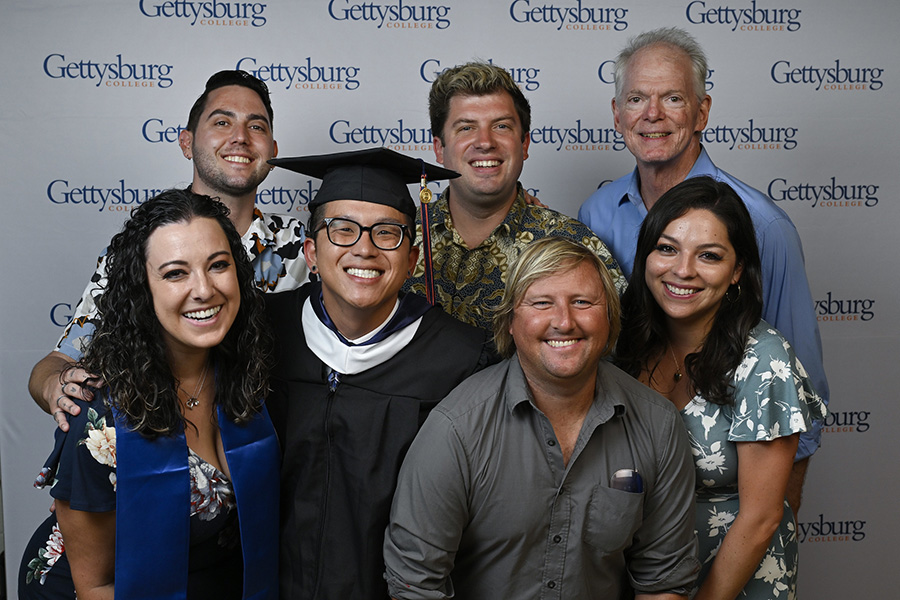
Following the singing of the Alma Mater by Marissa Duggan ’25, a health sciences major from Mechanicsburg, Pennsylvania, Bookwala delivered her charge to the class. Echoing West’s remarks, Bookwala highlighted the special responsibility the newest Gettysburg graduates possess as teachers and scholars to guide their students “in a world too often defined by what divides us rather than by what unites us.”
“May you encourage your students to secure the high ground and widen their own perspectives,” Bookwala said. “May you challenge them to question, to explore, and to seek truth in all that they see and do. And may you guide them not only to higher knowledge, but to higher thinking. We believe you will.”
Learn more about the Gettysburg College-Gilder Lehrman Master of Arts in American History program at gilderlehrman.org/Gettysburg or gettysburg.edu/academic-programs/history/programs/ma-american-history.
View photos from the Master’s Commencement Ceremony.

By Corey Jewart
Photos by Abbey Frisco and Jason Minick
Posted: 07/17/24